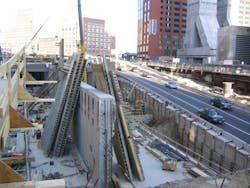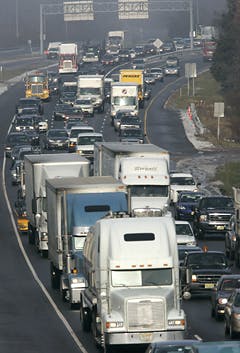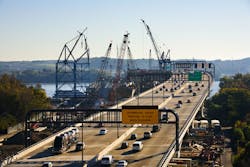I’ve touched on this topic before in this space – indeed, I quoted from one of Orski’s previous missives on this subject in here as well – but now the “flat funding” issue seems to be crystallizing into political reality.
As a result, meeting the future needs of transportation infrastructure in the U.S. may devolve into what might just be called a “making do with what we’ve got” effort.
Orski (above at right) – who served as associate administrator of the Urban Mass Transportation Administration under Presidents Richard Nixon and Gerald Ford and now publishes a transportation newsletter – posed this simple question at the outset of his article: Is the so-called “infrastructure crisis" we face in this country a myth or a reality?“Many within the transportation community firmly believe that the crisis is real,” Orski wrote.
“They point out that many of our roads, bridges and transit systems are approaching the end of their useful life and are badly in need of repair, reconstruction and modernization," he said. "They are convinced that without an ambitious program of investment – beyond the billions that already are being spent – the transportation infrastructure will continue to deteriorate, rendering great harm to the nation's economy.”
He also noted that America’s various transportation groups – such as the American Association of State Highway and Transportation Officials (AASHTO) – also find it difficult to understand why politicians and the public do not share the same sense of urgency.
“They tend to blame themselves for doing a poor job of ‘educating’ the public about the catastrophic consequences of inaction,” Orski noted.
But is this necessarily so, he asks? First, Orski explained, proponents of more robust spending ignore the political realities of mounting federal deficits ($1 trillion per each year of the Obama administration) and the shadow of a $16 trillion debt hovering over all fiscal decisions. As a result, he said, Congress is not about to vastly increase spending on transportation.Then, too, concern about deteriorating infrastructure has failed to resonate with the electorate during the election campaign. “The promise of transportation spending as a job creator proved to have little political credibility,” Orski pointed out. “Nor did the presidential candidates care to mention transportation in their recent debate on domestic priorities, despite pleas by stakeholder groups to include infrastructure on the political agenda.”
Finally, so-called “infrastructure crisis” believers decry this supposed "indifference" or "short-sightedness" on the part of the politicians and the public. But their anger is misplaced, contended Orski.
“People recognize and acknowledge the need to modernize and expand the nation's infrastructure. They simply are not convinced by the ‘sky is falling’ rhetoric employed by the alarmists – dire warnings of collapsing bridges and crumbling roads if government does not greatly increase spending on infrastructure,” he said.
“They trust their own eyes more than they trust the unverified claims of the experts – and what they see is highways and transit networks that are well maintained and functioning smoothly and reliably most of the time,” Orski added.“They suspect that warnings of catastrophic consequences if spending on infrastructure isn’t boosted are overblown, self-serving, and more often than not inspired by advocacy groups, lobbyists and industry spokesmen who have a financial stake in pushing for more federal spending," he stressed.
Moreover, Orski pointed out that the public is not sure that all of the billions of dollars that the federal government already devotes to transportation (some $114 billion in fiscal year 2012 alone) are spent wisely, nor that more money will make the transportation system perform any better (e.g. reduce congestion).
“They believe that the desire to greatly increase investment in infrastructure must be tempered by the overriding imperative to get the nation's fiscal house in order,” he said.
In sum, then, Orski expects transportation funding to either remain flat or actually decline in the future and emphasized that industry stakeholders should begin adjusting now to that impending reality.
“As one senior congressional aide confided to us, ‘I don't see our constituents lobbying to raise the gas tax in order to spend more money on transportation,’” Orski noted. “The bottom line: regardless of the outcome of the November elections, do not expect a boost in federal transportation spending.”




